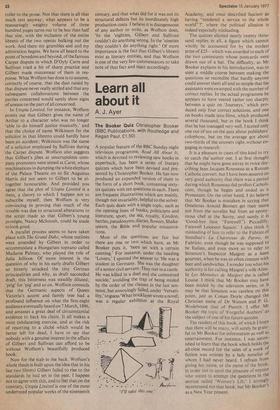Learn all about it
A. J. Ayer
The Booker Quiz Christopher Booker (BBC Publications, with Routledge and Kegan Paul, £1.50) A popular feature of the BBC Sunday night television programme, Read All About It, which is devoted to reviewing new books in paperback, has been a series of literary quizzes which have been devised and presented by Christopher Booker. He has now produced an expanded version of them in the form of a Short book, containing sixtysix quizzes with ten questions in each. There are frequent illustrations which are mainly, though not invariably, helpful to the solver. Each quiz deals with a single topic, such as the opening lines of books, politicians and literature, sport, the sea, royalty, Condon, battles, pseudonyms, diaries, flowers, Shakespeare, the Bible and popular misquotations.
Most of the questions are fair but there are one or two which have, as Mr Booker puts it, 'been set with a certain cunning.' For instance, under the heading 'Lovers,' I spotted the answer to 'He was a student in Germany. She was the daughter of a senior civil servant. They met in a castle. He was killed in a duel and she committed suicide,' avoiding the trap of being misled by the order of the clauses in the last sentence, but annoyingly failed, under 'Versatility,' to guess 'What bricklayer wrote a novel, was a regular exhibitor at the Royal
Academy, and once described fascism as having "rendered a service to the whole world" ?', where the political allusion is indeed especially misleading.
The quizzes elicited nearly twenty thousand replies in all, a figure which cannot wholly be accounted for by the modest prize of £25—which was awarded to each of the two contestants whose postcards were drawn out of a hat. The difficulty, as Mr Booker explains in his introduction, was to steer a middle course between making the questions so recondite that hardly anyone could answer them all and so simple that his assistants were swamped with the number of correct replies. In the actual programme he appears to have veered rather too sharply between a quiz on 'Journeys,' which produced only four correct solutions, and one on books made into films, which produced several thousand, but in the book I think that he has managed very well. I scored only one out of ten on the quiz about publishers' colophons, but on the average got about two-thirds of the answers right, without engaging in research.
It is a pleasure in cases of this kind to try to catch the author out. I at first thought that he might have gone astray in twice describing Jean Jacques Rousseau as a Roman Catholic convert, but I have been assured on very good authority that there was a period during which Rousseau did profess Catholicism, though he began and ended as a Protestant. On the other hand, I do believe that Mr Booker is mistaken in saying that Omelettes Arnold Bennett get their name not from the novelist but from an eponymous chef at the Savoy, and surely it is 'Good-bye (not "Farewell") Piccadilly, Farewell Leicester Square.' I also think it misleading of him to refer to the Fabrice of Stendhal's La Chartreuse de Partne, as Fabrizio, even though he was supposed to be Italian, and even more so to refer to Simenon's Inspector Maigret as a keen gourmet, when he was so often content with beer and sandwiches. I wonder too what his authority is for calling Maigret's wife Aline. In Les Memoires de Maigret she is called Louise. I think that Mr Booker may have been misled by the television series, or it may be that Simenon was careless on this point, just as Conan Doyle changed the Christian name of Dr Watson and P. a Wodehouse that of Psmith. I offer Mr Booker the topic of 'Forgetful Authors' as the subject of one of his future quizzes.
The readers of this book, of which I hope that there will be many, will surely be grateful to Mr Booker for information as well as entertainment. For instance, I was astonished to learn that the book which holds the all-time record for the sales of a work of fiction was written by a lady novelist of whom I had never heard. I refrain from giving her name, or the name of the book, in order not to spoil the pleasure of anyone who wants to attempt the questions in the section called 'Women's Lib.' I stronglY recommend not that book, but Mr Booker's as a New Year present.


































 Previous page
Previous page